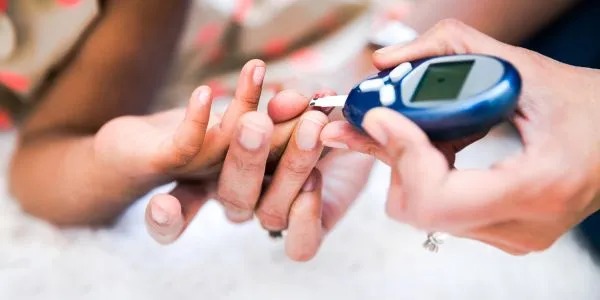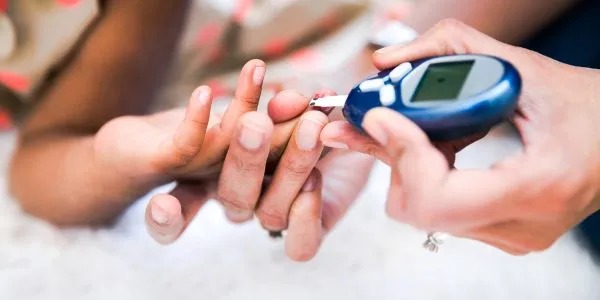Understanding Childhood Diabetes
Diabetes is a long-term condition in which the body cannot effectively manage blood sugar (glucose) levels. In children, this condition can manifest in different forms, with distinct symptoms and treatment approaches.

Type 1 Diabetes: Common Symptoms in Children
Type 1 diabetes requires immediate medical attention as it can develop rapidly in children. This type of diabetes develops when the pancreas produces little or no insulin insufficient or no Insulin, the hormone essential for controlling blood sugar levels regulating blood sugar levels allowing glucose to enter cells and provide energy.
The onset of type 1 diabetes in children is often sudden and can be accompanied by these telltale symptoms:
- Extreme thirst (polydipsia): Children may suddenly start drinking much more than usual and complain of being constantly thirsty.
- Frequent urination (polyuria): A child who was previously toilet-trained might start wetting the bed again or need to use the bathroom more frequently, including during the night.
- Unexplained weight loss: Children developing type 1 diabetes may experience rapid weight loss even if they are eating normally or more than usual Increased hunger: The body’s inability to convert glucose into energy can lead to constant hunger.
- Fatigue and weakness: Without proper glucose metabolism, children may become unusually tired, lethargic, or irritable.
- Fruity breath odor: A sweet, fruity smell on the breath can indicate ketoacidosis, a serious complication of diabetes.
- Blurred vision: Elevated blood sugar levels can interfere with the eyes’ ability to focus properly, causing temporary vision problems.
Managing type 1 diabetes involves insulin therapy and regular blood sugar monitoring. Timely diagnosis is essential to avoid severe complications like diabetic ketoacidosis (DKA), which can be life-threatening.
Type 2 Diabetes Symptoms Children May Experience
Compared to type 1 diabetes, type 2 diabetes generally develops more gradually over time Progresses gradually and is often linked to lifestyle choices develops slowly over time over time when once rare in children but has become increasingly common, particularly among adolescents. Type 2 diabetes symptoms children exhibit may include dark patches on the skin and slow-healing wounds. This type of diabetes is defined by insulin resistance, meaning the body’s cells respond poorly to insulin effectively if the body doesn’t use insulin properly.
Symptoms of type 2 diabetes in children often develop more gradually and may include:
- Dark, velvety skin patches (acanthosis nigricans): These typically develop In places where the skin folds or creases, like the neck and underarms, or groin.
- Slow-healing sores or frequent infections: High blood sugar levels can interfere with the body’s natural healing processes.
- Frequent thirst and urination: These symptoms are also common in type 1 diabetes, but may be less dramatic in onset.
- Fatigue: Children may seem more tired than usual or lack energy for normal activities.
- Increased hunger: Despite eating regularly, the child may still feel hungry.
- Blurred vision: Variations in blood sugar levels can impair eyesight.
- Numbness or tingling: in the hands and feet: This may be a sign of nerve damage caused by elevated blood sugar levels.
Unlike adults, type 2 diabetes symptoms children experience can sometimes be subtle, making regular check-ups with a healthcare provider essential, especially if risk factors like obesity or family history are present.
Early Signs of Diabetes That Parents Should Never Ignore
Identifying the early symptoms of diabetes allows for prompt treatment and improved outcomes. Parents should be vigilant about the signs of diabetes, especially if there’s a family history. Early diagnosis and timely treatment can Lower the chances of serious complications and improve overall health results long-term health outcomes..
Frequent Urination: A Key Warning Sign of Diabetes in Children
Frequent urination, especially at night, is often one of the first noticeable symptoms of diabetes in children. When blood sugar levels rise, the kidneys increase their effort to filter and reabsorb the excess glucose. If they become overwhelmed, the extra glucose is expelled in the urine, which pulls water along with it, which increases the volume of urine.
Parents should pay attention if their child experiences frequent urination along with increased thirst. If your previously toilet-trained child suddenly starts wetting the bed or needs to use the bathroom more frequently than usual, it could be a warning sign worth discussing with a healthcare provider.
Understanding Diabetes Type 1 Symptoms Children Commonly Show
Diabetes type 1 symptoms children commonly show include extreme thirst, frequent urination, and sudden weight loss. These symptoms often appear suddenly and worsen quickly over days or weeks. Parents should be aware of diabetes type 1 symptoms children might exhibit, such as fatigue and irritability.
Other warning signs include:
- Mood changes: Children may become irritable, moody, or show behavior changes due to fluctuating blood sugar levels.
- Yeast infections: Girls with undiagnosed type 1 diabetes may develop genital yeast infections due to excess sugar in the urine.
- Breath that has a fruity or nail polish remover-like odor: This can indicate ketoacidosis, a serious condition requiring immediate medical attention.
- Stomach pain, nausea, or vomiting: These can be signs of ketoacidosis, especially when accompanied by other diabetes symptoms.
If you experience these symptoms, it’s important to seek medical attention promptly. Consulting a childhood diabetes specialist in Delhi is essential for proper diagnosis and treatment planning.
Choosing the Best Clinic for Your Child’s Endocrine Health
A specialized pediatric endocrinology clinic in Delhi offers comprehensive care for children with diabetes. These clinics provide specialized services tailored to the unique needs of children with endocrine disorders, including diabetes.
When choosing a pediatric endocrinology clinic in Delhi, consider factors like expertise and available services. Look for clinics that offer:
- Comprehensive diagnostic services: Including blood tests, glucose tolerance tests, and other specialized assessments.
- Multidisciplinary care teams: Including endocrinologists, diabetes educators, nutritionists, and mental health professionals.
- Patient education programs: To help children and families understand and manage diabetes effectively.
- Availability of the most advanced treatment technologies, including insulin pumps and continuous glucose monitoring systems.
- Support services: Including counseling and support groups for children and families.
Indus Hospital Delhi provides specialized care for children with diabetes and other endocrine disorders. Featuring advanced facilities and a team of skilled healthcare professionals, the hospital offers comprehensive diabetes management services for children of all ages.
Choosing the Right Specialist for Your Child’s Health
Finding the best endocrinologist in Delhi NCR ensures your child receives expert care for diabetes management. When selecting a specialist, consider their experience with pediatric cases, approach to treatment, and communication style.
The best endocrinologist in Delhi NCR will Develop a customized treatment plan for your child, considering their specific needs, age, lifestyle, and overall health. They will work in close coordination with other healthcare professionals to provide comprehensive care.
Dr Niti Agarwal specializes in diagnosing and treating various endocrine disorders in children. With extensive experience in pediatric endocrinology, she offers expert care for children with diabetes at Indus Hospital. Her approach emphasizes individualized treatment plans that address each child’s unique needs.
For expert pediatric diabetes care, Dr Niti Agarwal offers comprehensive services at Indus Hospital, including:
- Detailed diagnostic evaluations: To accurately identify the type of diabetes and assess overall health.
- Personalized treatment planning: Tailored to each child’s specific needs and circumstances.
- Ongoing management and monitoring: To ensure optimal blood sugar control and prevent complications.
- Education and support: To help children and families understand and manage diabetes effectively.
How Weight Management Experts Help Children with Diabetes
A weight management specialist in Delhi NCR can help diabetic children maintain healthy body weight. This is particularly important for children with type 2 diabetes, as weight management is often a key component of treatment.
Consulting a weight management specialist in Delhi NCR is important for children with type 2 diabetes. These specialists can provide:
- Personalized nutrition plans: Tailored to the child’s age, activity level, and specific health needs.
- Physical activity recommendations: Appropriate for the child’s age and fitness level.
- Behavioral strategies: To help children and families make sustainable lifestyle changes.
- Monitoring and support: To oversee progress and make necessary adjustments plans as needed.
At Indus Hospital, weight management services are integrated with diabetes care, providing a comprehensive approach to treatment. This well-rounded approach addresses every aspect of the condition care process and thoroughly addresses a child’s health, leading to better outcomes.
Recognizing Diabetes Symptoms in Children: A Guide for Parents
Diabetes symptoms in children may differ from those in adults and require specialized attention. As a parent, being aware of these symptoms can help you seek timely medical care for your child.
Early recognition of diabetes symptoms in children leads to better management and outcomes. Here’s what to watch for:
Common Symptoms Across All Types of Diabetes
- Increased thirst and dry mouth: Children may suddenly start drinking much more than usual.
- Frequent urination: Including bedwetting in previously toilet-trained children.
- Fatigue and weakness: Children may seem unusually tired or lack energy.
- Blurred vision: High blood sugar can affect eyesight.
Specific Symptoms by Diabetes Type
For Type 1 diabetes:
- Significant weight loss happening despite eating as usual or more
- Fruity breath odor
- Rapid, deep breathing
- Stomach pain, nausea, or vomiting
For Type 2 diabetes:
- Dark, velvety skin patches (acanthosis nigricans)
- Slow-healing sores
- Numbness or tingling in hands and feet
- Obesity or difficulty losing weight
Many parents ask what are symptoms of diabetes in children that require immediate medical attention. Symptoms that warrant immediate care include:
- Rapid, deep breathing: This can indicate diabetic ketoacidosis, a serious complication.
- Fruity breath odor: Another sign of ketoacidosis.
- Extreme lethargy or confusion: Which can indicate severely high or low blood sugar.
- Loss of consciousness: A medical emergency that requires immediate attention.
What are symptoms of diabetes in children? They include increased thirst, frequent urination, and unexplained weight loss. If you notice these symptoms in your child, consult a healthcare provider promptly.
Diabetes and Reproductive Health in Adolescents: What Parents Should Know
Diabetes can impact reproductive health in adolescents, making specialized care essential. For adolescents with diabetes, puberty and reproductive health present unique challenges that require careful management.
Addressing reproductive health in adolescents with diabetes is an important aspect of comprehensive care. Issues that may arise include:
- Delayed or irregular menstruation: Girls with poorly controlled diabetes may experience menstrual irregularities.
- Increased risk of polycystic ovary syndrome (PCOS): Particularly in girls with type 2 diabetes.
- Potential impact on fertility: Poorly controlled diabetes May impact reproductive health in both men and women.
- Contraception considerations: Some hormonal contraceptives may affect blood sugar control.
- Pregnancy planning: For older adolescents, understanding the importance of planned pregnancy with well-controlled diabetes is essential.
Specialized care that addresses both diabetes management and reproductive health is crucial for adolescents. At Indus Hospital, adolescent reproductive health services are integrated with diabetes care, providing comprehensive support during this critical developmental stage.
Diagnosis and Testing for Diabetes in Children
If you suspect your child may have diabetes, prompt medical evaluation is essential. The diagnostic process typically includes:
- Blood glucose testing: To monitor blood sugar levels.
- Glycated hemoglobin (A1C) test: To assess average blood sugar levels over the past 2-3 months.
- Autoantibody testing: To help distinguish between type 1 and type 2 diabetes.
- Urine tests: Used to identify glucose presence and ketones in the urine.
For comprehensive diabetes management, Indus Hospital Delhi offers advanced diagnostic and treatment facilities. The hospital’s state-of-the-art laboratory and imaging services ensure accurate diagnosis and effective monitoring of diabetes in children.
Modern Treatment Approaches for Childhood Diabetes
Treatment for childhood diabetes has advanced significantly in recent years, with new technologies and approaches Enhancing outcomes and quality of life for children affected Enhancing outcomes and quality of life for affected children.
Urine tests: Used to detect glucose in the urine
Insulin Therapy and Monitoring
Insulin therapy is vital for children with type 1 diabetes. Modern approaches include:
- Multiple daily injections (MDI): Using different types of insulin to mimic the body’s natural insulin production.
- Insulin pump therapy: A compact device that provides A steady delivery of insulin throughout the day.
- Continuous glucose monitoring (CGM): Devices that measure Blood sugar levels monitored continuously day and night, offering valuable data for treatment adjustments.
Lifestyle Management
For all types of diabetes, lifestyle management is crucial and includes:
- Nutrition planning: Working with a A dietitian to Create a meal plan aimed at maintaining balanced blood sugar levels steady levels while supporting normal growth and development.
- Physical activity: Regular exercise helps improve insulin sensitivity and overall health.
- Blood sugar monitoring: Regular checking of blood sugar levels to guide treatment decisions.
- Education: Teaching children and families about diabetes management, Including guidance on identifying and managing both high and low blood sugar levels.
Psychological Support
Living with diabetes can be challenging for children and families. Comprehensive care includes:
- Counseling: To support children and families in managing the emotional challenges aspects of diabetes.
- Support groups: A way to connect with others experiencing similar challenges.
- School planning: Working with schools to ensure children’s needs are met during school hours.
Preventing Complications: The Importance of Regular Follow-up
Regular follow-up care is essential for children For people with diabetes, to avoid complications and promote optimal health. Follow-up typically includes:
- Regular check-ups: To monitor overall health and diabetes control.
- A1C testing: Every 3-6 months to assess long-term blood sugar control.
- Screening for complications: Including eye exams, kidney function tests, and foot examinations.
- Adjustment of treatment plans: As needed based on growth, development, and changing needs.
At Indus Hospital, comprehensive follow-up care is provided to ensure children with diabetes maintain optimal health and prevent complications.
Conclusion: Taking Action for Your Child’s Health
If you notice symptoms of diabetes in your child, seeking prompt medical attention is crucial. Early detection and care can lower the likelihood of serious complications and promote better health and enhance overall health long-term outcomes.
Consulting a childhood diabetes specialist in Delhi is crucial for proper diagnosis and management. With expert care from specialists like Dr Niti Agarwal at Indus Hospital, children with diabetes can lead healthy, active lives.
A childhood diabetes specialist in Delhi can provide Personalized comprehensive care designed to meet your child’s unique needs are addressed through this specialized care, ensuring every aspect of diabetes management is addressed, from medical treatment to education and support.
Keep in mind, although diabetes is a serious condition, with proper management, children with diabetes can thrive and achieve their full potential. The key is early recognition, prompt treatment, and ongoing comprehensive care from experienced healthcare professionals.For families in Delhi NCR seeking specialized diabetes care for their children, Indus Hospital offers comprehensive services under the expert guidance of some of the best pediatric endocrinologists in Delhi. With a focus on personalized care and the latest treatment approaches, the hospital provides the support children and families need to effectively manage diabetes and maintain optimal health.



